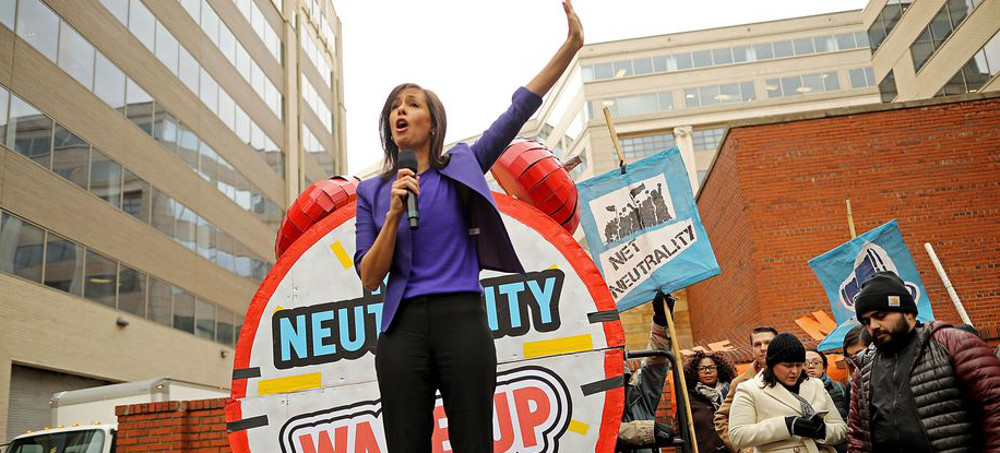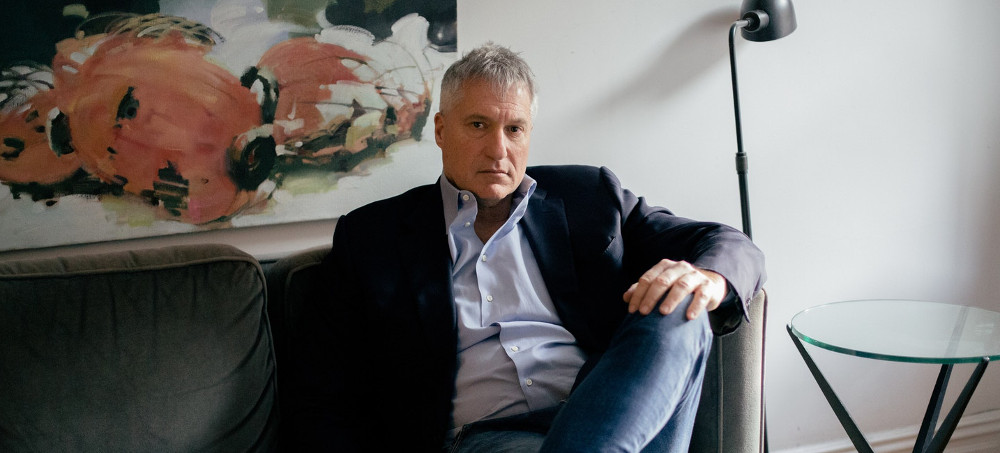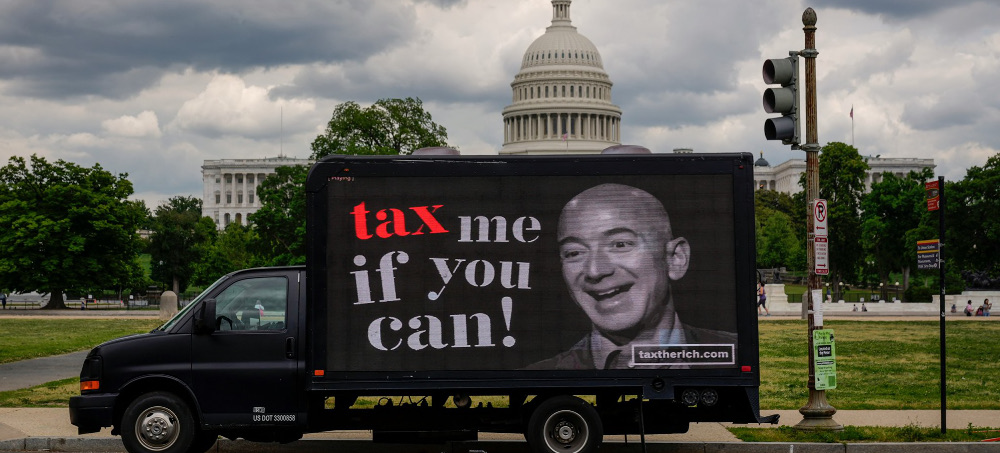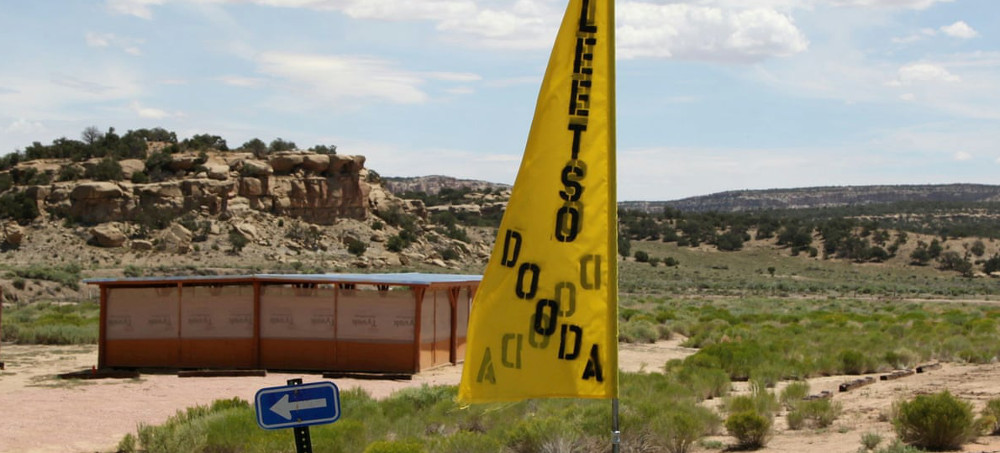Live on the homepage now!
Reader Supported News
The article below is satire. Andy Borowitz is an American comedian and New York Times-bestselling author who satirizes the news for his column, "The Borowitz Report."
According to Trump’s legal argument, his status as a Russian official during his four years in the White House makes all documents produced during his tenure property of the Russian Federation.
“Any attempt by the U.S. to seize Russian property will be seen as an act of war,” a letter from Trump’s legal team reads.
While Trump waits to see if his claim of diplomatic immunity succeeds, he is also prepared to argue that, having once hired Rudolph Giuliani as his attorney, he would be justified in pleading insanity.
 Jessica Rosenworcel, seen here at a protest against the net neutrality repeal, is the new permanent chair of the FCC. (photo: Chip Somodevilla/Getty)
Jessica Rosenworcel, seen here at a protest against the net neutrality repeal, is the new permanent chair of the FCC. (photo: Chip Somodevilla/Getty)
Net neutrality is back on the table.
It took over nine months, but Biden has picked the FCC’s chair and nominated someone to fill the long-vacant spot for a fifth commissioner. Jessica Rosenworcel, who has served as acting chair since January, will continue to lead as the agency’s permanent chair; she was also nominated for a new term, which would be her third. And Biden nominated Gigi Sohn, a former FCC staffer and prominent advocate for an open and affordable internet, to fill the agency’s last spot.
Assuming the confirmations go through, which is expected because Democrats control the Senate, the biggest change to watch for is that the FCC will finally have the Democratic majority it needs to bring back Obama-era net neutrality rules, which have become a hugely divisive issue between Democrats and Republicans.
“It’s the honor of a lifetime to be designated to serve as FCC chair,” Rosenworcel said in a statement.
Obama’s FCC passed net neutrality in 2015. It’s best known as the rule that forces internet service providers, or ISPs (Comcast, Verizon, and AT&T, for instance), to treat all of the data that travels across their networks equally. Under those rules, these companies couldn’t charge more if customers go to certain sites, or make their internet speeds faster or slower depending on where they go and the services they use. The term net neutrality was coined by Tim Wu, who, incidentally, is currently serving as Biden’s adviser on technology and competition policy. Net neutrality opponents believe the rule stifles innovation and discourages internet service providers from investing in their networks.
In order to pass net neutrality, the FCC reclassified broadband from an information service to a common carrier, like telephone service. That then gave the FCC more regulatory power over it. The reclassification also allowed the FCC to make new privacy rules that ISPs had to get customers’ permission before collecting and sharing their data, such as their web browsing histories.
When Trump took office, his FCC, chaired by Ajit Pai, quickly set about repealing net neutrality and re-reclassifying broadband as an information service. Those ISP privacy protections never went into effect, and internet service providers were able to continue to collect, sell, or share customer data — which they very much do, per a recent FTC report. The feared onslaught of extra charges to access certain websites or blocking others didn’t come when net neutrality was repealed, but the FCC effectively ceded much of its control over broadband providers and services as they became an increasingly essential part of Americans’ lives.
Biden said in his executive order that he wants the FCC to bring net neutrality back. But he took a surprisingly long time to nominate the commissioners he’d need to make that happen. Since Biden took office, the FCC has been deadlocked at two Republican commissioners (Nathan Simington, who was confirmed in the waning days of Trump’s presidency, and Brendan Carr) and two Democrats (Rosenworcel and Geoffrey Starks).
“The real issue is this: We’ve already lost a year,” Harold Feld, senior vice president at open internet advocacy group Public Knowledge, told Recode. Feld worked for Sohn when she was the CEO of Public Knowledge, which she co-founded.
The 2-2 FCC has done a lot of work over the last nine months to expand broadband internet and put programs in place to help lower-income people afford it (Sohn is also big on this, telling Recode last year that affordability is the biggest hurdle to closing the digital divide). The pandemic made it obvious that broadband internet access was no longer a luxury, it is an essential service. But there was no way a deadlocked FCC was going to pass net neutrality. As months went by with no apparent action on naming a permanent chair or appointing a fifth commissioner, Democrats began to lose patience. On September 22, 25 Democratic senators wrote a letter to Biden urging him to name Rosenworcel as the permanent chair “as quickly as possible.”
Sen. Amy Klobuchar (D-MN), who was one of the signees, said in a statement to Recode that she strongly supports the two nominations, adding: “Strong leadership at the FCC is essential to deliver on the connectivity goals our 21st-century economy demands. … I am confident that both Rosenworcel and Sohn have the expertise needed to close the digital divide and strengthen our nation for generations to come.”
Rep. Anna Eshoo (D-CA), who told Recode back in January that Rosenworcel was her pick for FCC chair, lauded Biden’s picks as “historic,” noting that Rosenworcel is the first woman to serve as the FCC’s permanent chair and Sohn will be its first openly LGBTQ+ commissioner.
“Rosenworcel and Sohn are brilliant champions for innovation, public safety, national security, universal broadband, net neutrality, and social justice,” Eshoo said.
Assuming Biden’s nominations go through, the FCC will have three commissioners who are on record as staunch advocates of net neutrality, which makes an attempt to bring it back almost a certainty. Starks has called it a “critical issue” that the FCC “dropped the ball” on when it was repealed. Rosenworcel was an FCC commissioner back in 2015 when net neutrality initially passed, and she voted for it; she was an opponent of its repeal, saying it “put the agency on the wrong side of the public, the wrong side of history, and the wrong side of the law.” And Sohn was the counselor to Obama-era FCC chair Tom Wheeler when net neutrality was passed. She’s consistently pushed for its reinstatement, saying in 2019 that it’s “critically important to the future of the Internet that net neutrality and important FCC oversight get reinstated.”
“The FCC can now return to being a champion for consumers,” Wheeler told Recode. “Gigi Sohn is a proven and tested consumer champion; together with Geoffrey Starks, chair-designate Rosenworcel has the opportunity to reverse the practices of the Trump years and return the agency to its consumer and competition responsibilities.”
But net neutrality won’t happen immediately, even under the best circumstances.
“It takes a long time to get an FCC order written,” Feld said. “It’s a very complicated process. Particularly for something like this, where there’s going to be a lawsuit, and it’s going to be contentious.”
Net neutrality isn’t the only thing the FCC will likely take back up from the Obama era. The Biden order also called on the FCC to bring back the “broadband nutrition label” that would clearly spell out for consumers how much they pay for their broadband internet service (including all those hidden fees) and the speeds they get for that money.
The FCC will also likely take more action on consumer protection and competition matters, Feld said. Biden’s order asked the FCC to require broadband providers to tell the agency their rates and subscriber counts, ban early termination fees that keep customers locked in, and stop landlords from making deals with cable and broadband companies that restrict tenants’ choice in providers. Feld expects those measures will bring broadband prices down. While broadband rates vary across the country, the United States, on average, pays more for internet than most of the rest of the world. The FCC is also in the process of opening up more radio frequencies, or spectrum, for 5G services, improving its flawed broadband maps, and ridding us of the scourge of robocalls and texts.
It remains to be seen whether the FCC has enough time to see all of Biden’s initiatives — and those of the now-permanent chair — through the House and the Senate. His slow path to getting his FCC in place might have squandered the possibly limited time it will have if Democrats lose control of Congress next year and the presidency in 2024. Still, Feld thinks the FCC will go back to its traditionally lower-profile role — “the technical and boring stuff.”
“I say this as the ultimate compliment: Jessica Rosenworcel is the wonkiest, nerdiest possible choice for FCC chair,” Feld said. “Which is exactly what you want.”
 Steven Donziger sits for a portrait at his home in Manhattan, N.Y., where he is on house arrest. (photo: Annie Tritt/The Intercept)
Steven Donziger sits for a portrait at his home in Manhattan, N.Y., where he is on house arrest. (photo: Annie Tritt/The Intercept)
The environmental and human rights lawyer Steven Donziger joins us just before he is ordered to report to jail today, after a years-long legal battle with the oil company Chevron and 813 days of house arrest. In 2011, Donziger won an $18 billion settlement against Chevron on behalf of 30,000 Indigenous people in Ecuador for dumping 16 billion gallons of oil into their ancestral land in the Amazon. Since the landmark case, Donziger has faced a series of legal attacks from Chevron and a New York federal judge, who has employed a private law firm linked to the oil company to prosecute him. Earlier this month, he was sentenced to six months in prison for contempt of court, and his request for bail pending his appeal was denied. Amnesty International and United Nations human rights advocates, along with several U.S. lawmakers, are calling for Donziger’s immediate release. “Chevron and these two judges, really allies of the fossil fuel industry, are trying to use me as a weapon to intimidate activists and lawyers who do this work,” says Donziger. “I need to be prosecuted by a neutral prosecutor, not by Chevron.”
The environmental human rights lawyer Steven Donziger is reporting to jail today, after a federal appellate court rejected his request for bail pending his appeal. Earlier this month, Steve Donziger was sentenced to six months in prison for contempt of court — a misdemeanor. Donziger has already spent over two years under house arrest after being targeted by the oil giant Chevron.
The case stems from Steve’s role in suing Chevron on behalf of 30,000 Amazonian Indigenous people for dumping 16 billion gallons of oil into their ancestral land in the Ecuadorian Amazon. Ten years ago, Ecuador’s Supreme Court ordered Chevron to pay $18 billion. The landmark ruling was seen as a major victory for the environment and corporate accountability. But Chevron refused to pay or clean up the land. Instead, it launched a legal attack targeting Donziger.
In July, a federal judge found him guilty of six counts of criminal contempt of court, after he refused to turn over his computer and cellphone. In an unusual legal twist, the judge appointed a private law firm with ties to Chevron to prosecute Donziger after federal prosecutors declined to bring charges.
Amnesty International recently called for his immediate release, saying he was being arbitrarily detained. The U.N.’s Working Group on Arbitrary Detention has also called for his release.
Well, as he prepares to report to prison later today, Steve Donziger is joining us from his home in New York where he’s been under house arrest for 813 days. Meanwhile, in Washington, D.C., there will be a major news conference held today outside the Capitol.
Steve Donziger, welcome back to Democracy Now! Where are you heading to prison today? We’re talking about a misdemeanor. You’ve already been under house arrest for nearly a thousand days.
STEVEN DONZIGER: It’s just extraordinary, Amy. Thank you for the introduction. I mean, it pretty much captured it. What I’ll say is I have to report to prison by 4:48 p.m. today, which is in itself highly unusual. I don’t believe I’m guilty. No lawyer has ever spent more than 90 days in home confinement — maximum sentence ever given to a lawyer convicted of my charge, which is misdemeanor contempt. I’ve already spent over eight times that at home. And on top of that, Judge Preska is trying to put me in prison for six months. And, you know, another unusual feature is she’s making me report within 24 hours after this latest court ruling that came down yesterday, rather than allowing me time to report, you know, in a normal course to a prison. So, there’s so much about this that doesn’t —
AMY GOODMAN: And which prison are you going to be held at?
STEVEN DONZIGER: I don’t know yet. You know, by forcing me in so quickly, Judge Preska, I believe, is trying to force me into a local federal jail, that I think is very unsafe. I mean, I have no security risk at all. I’ve never been convicted. It’s the lowest-level offense. So, normally, I would go to federal prison camp. And, you know, we need time for the Bureau of Prisons to designate me to an appropriate facility. Instead, she’s trying to force me very quickly, I think, into a local jail, which concerns me greatly, frankly. And I think that’s one reason why Amnesty International put out an urgent action bulletin two days ago for people to write to the attorney general, Garland, to just stop this case.
I mean, the other crazy thing about this that is so disturbing, Amy, is that I was not prosecuted by the U.S. government. I was prosecuted by a private law firm, Seward & Kissel, appointed by a federal judge after the U.S. government declined to prosecute me. And the judge never disclosed that the law firm had Chevron as a client. So, essentially, I’m being prosecuted by a Chevron law firm, a partner in a Chevron law firm, a private law firm, who deprived me of my liberty. I’m the only person ever charged with this offense held pretrial, at home or in prison — never happened before for even a day. It’s over 800 days. So, you know, this is the first corporate prosecution in U.S. history. I have never seen a case like this, nor have other legal experts that work with me. And, you know, we just think, you know, to restore the rule of law as regards Steve Donziger and the people of Ecuador, this case has to be stopped and taken over by the Department of Justice. I mean, they could do what they want with it. I mean, if they went to prosecute me, prosecute me, but I need to be prosecuted by a neutral prosecutor, not by Chevron.
AMY GOODMAN: So, I want to just talk about some of the people who are supposed to be at your news conference in Washington. We just interviewed a climate striker on a hunger strike in Washington, D.C., and we heard from Congressmember Rashida Tlaib. She’ll be there at your news conference. Also you have Chuy García, Congressmember Jesús “Chuy” García from Chicago, Congressmember Jim McGovern of Massachusetts, as well as a number of people from Amnesty International, Law Students for Climate Accountability. Talk about the significance — I mean, you have so many supporters at this point at high levels, yet talk about what’s at stake, what it is you exposed in Ecuador.
STEVEN DONZIGER: Well, I think the stakes are high, and it goes way beyond me personally. I mean, on a personal level, it hurts. I have a wife and a 15-year-old son, and, you now, we’re hurting, OK?
But let’s just get real here. What’s really happening here is Chevron and these two judges and, really, allies of the fossil fuel industry are trying to use me as a weapon to intimidate activists and lawyers who do this work, who do the frontline work of defending the planet. What’s at stake, really, I mean, not only my freedom — what’s at stake is the ability to advocate for human rights in our society. I mean, the things I was charged with were — I was a lawyer litigating various court orders, you know, for years, ethically. You know, I’m proud of my work. And this judge just went after me. I’m the only lawyer ever in U.S. history to be charged with criminal contempt of court for challenging a civil discovery order on appeal. That’s essentially what happened.
So, you know, I’m calling on judges and people in Congress, like Representative Tlaib and Jim McGovern and Cori Bush and others who stepped up for me, to continue speaking out, to enlist more people. We need people in the Senate. And ultimately, we need the Biden administration. I mean, I heard your previous guest. I mean, the Biden administration is essentially letting a climate change lawyer, me, an environmental justice lawyer, an Indigenous rights lawyer, an Earth defender, a water protector, be locked up on American soil.
And it’s getting really embarrassing for our country. You know, it’s not every day that Amnesty International issues an urgent action for an American citizen. It’s probably the second time in 20 years that this has happened, OK? It’s not every day that the United Nations Working Group on Arbitrary Detention issues an order that someone in the United States’s case is a violation of multiple provisions of international law and shows an appalling degree of lack of impartiality by judges.
You know, so our country needs to deal with this. It really goes to what kind of society we want to live in. And it really relates to the climate issue, because, again, I believe this whole thing is being orchestrated by Chevron, not just for Chevron, but for the entire fossil fuel industry. They don’t want people speaking out. They don’t want successful litigation to hold them to account for their pollution in ways that will help save the planet. And I think, ultimately, that’s what this is about. And people need to pay serious attention to what’s happening to me —
AMY GOODMAN: Steven Donziger, you have called the devastation in Ecuador the “Amazon Chernobyl.” Explain why. Explain the original lawsuit that resulted in an $18 billion judgment against Chevron.
STEVEN DONZIGER: Basically, Chevron, in the form of Texaco, its predecessor company, went into the Amazon of Ecuador and decided to create an operational system, with literally hundreds of wells, where they deliberately dumped toxic waste into waters — into rivers and streams that Indigenous groups relied on for their drinking water, bathing and fishing, creating a mass industrial poisoning of a 1,500 square mile area. And literally hundreds, if not thousands, of people have died. I’ve been there over 250 times.
The affected communities went to court, in the court Chevron wanted it, the trial, to happen, in Ecuador. They won the case. Chevron has attacked me, attacked them, for 10 years, with the help of these federal judges.
In the meantime, people are suffering. And, you know, the degree of contamination is appalling. I mean, it is the Amazon Chernobyl. It’s the very definition of ecocide, in my opinion. I mean, it’s just a deliberate decision, in order to save money, to dump 16 billion gallons of cancer-causing waste onto Indigenous ancestral lands.
And the problem is still there. The case has been going on 28 years. And no matter what happens to me — and I hope I’ll be OK, I hope I’ll get through this, I expect to get through this — the communities in Ecuador are suffering tremendously, and they need help. And Chevron needs to step up and comply with the rule of law and pay the judgment that it owes to the people of Ecuador.
AMY GOODMAN: Well, I want to thank you so much for being with us. Clearly, the fight against oil extraction in the Amazon continues. A lawsuit was filed just last week. Again, you tweeted yesterday — around breaking news, you tweeted, “After” — just to give people a sense — “After 100 pages of legal briefing, the appellate court today denied my release in 10 words. This is not due process of law. Nor is it justice.” In these last 30 seconds, is it definite you will be jailed tonight?
STEVEN DONZIGER: Nothing is ever definite. We are going to make one final attempt to go back to my trial judge and ask for more time so I can get properly designated to an appropriate federal prison. I don’t know if she’ll grant it. We’re going to do that shortly. I am prepared and fully expect to, around 2:00 today, leave my home on the Upper West Side of Manhattan and report to prison, where I will spend the next six months.
AMY GOODMAN: After serving over two years under house arrest for a misdemeanor. Steven Donziger, the environmental lawyer targeted by Chevron after he successfully sued the oil giant for ecological devastation in the Ecuadorian Amazon.
 Billionaire businessman Jeff Bezos is depicted on a mobile billboard calling for higher taxes on the ultra-wealthy near the U.S. Capitol on May 17. (photo: Drew Angerer/Getty)
Billionaire businessman Jeff Bezos is depicted on a mobile billboard calling for higher taxes on the ultra-wealthy near the U.S. Capitol on May 17. (photo: Drew Angerer/Getty)
But it was unclear whether there was enough Democratic support to pass the proposal presented by Chairman Ron Wyden or a proposed 15% corporate minimum tax on the most profitable U.S. corporations.
Those two ideas, as well as tougher tax enforcement, are among the mechanisms Biden's Democrats are considering to fund a pair of bills together worth about $3 trillion to rebuild the nation's infrastructure, boost social spending and fight climate change. The party is struggling to reach consensus on both the scope of the bills and how to pay for them.
Wyden and other lawmakers, including Democratic Senator Elizabeth Warren, say the tax legislation is intended to curtail tax avoidance by corporations and the wealthy and could generate hundreds of billions of dollars to pay for Biden's plan.
Aides in Congress said the billionaires tax, affecting roughly 700 taxpayers with over $1 billion in assets or $100 million in annual income for three consecutive years, would impose a 23.8% tax rate for long-term capital gains on tradable assets, whether or not they have been sold. It would also allow taxpayers to take deductions for losses on assets.
The tax on billionaires faces potential opposition from other Democrats who favor Biden's original proposal, which would raise tax rates on companies and the wealthy but also faces an uphill fight in the Senate.
Senator Bernie Sanders, a leading progressive, said the billionaires tax was a "step in the right direction" but not nearly enough.
"Every sensible revenue option seems to be destroyed," he told reporters.
Democrats need to keep all of their members in line for legislation to pass the Senate, which is split evenly between Democrats and Republicans.
Democratic Senator Joe Manchin, a centrist who has forced Biden to scale back the spending package, reacted with skepticism to the billionaires tax proposal.
"I don't like the connotation that we are targeting different people," he told reporters.
Manchin said he would support a minimum 15% tax on wealthy individuals, similar to the 15% corporate minimum tax that Democrats have proposed.
The minimum corporate tax would dovetail with a global corporate minimum tax recently agreed to by 136 countries and aimed at corporations that pay little or no tax by gaming the international tax system.
It would apply to many large American companies, such as Apple Inc (AAPL.O), Amazon.com Inc (AMZN.O), JPMorgan Chase & Co (JPM.N) and Johnson & Johnson Inc (JNJ.N).
The debate, and other divisions among Democrats about the scope of Biden's plans, looked likely to derail the party's hopes of passing major legislation this month - to the dismay of Biden, who hoped to land a legislative victory on climate change before starting a trip abroad on Thursday that includes an international conference on the matter.
Some experts say the billionaires tax could be difficult to enforce.
"Government staffers tend to be outmatched by the most sophisticated, best-resourced taxpayers out there," said Steve Rosenthal, a senior fellow at the Tax Policy Center, a Washington think tank.
Tesla Inc (TSLA.O) Chief Executive Elon Musk blasted the plan on Twitter.
"Eventually they run out of other people's money and then they come for you," said Musk, who early this week was worth about $230 billion, according to Refinitiv. "Who is best at capital allocation -- government or entrepreneurs -- is indeed what it comes down to."
Not all billionaires are opposed to the plan. George Soros, the investor and liberal activist, is "supportive," his spokesperson told Reuters on Monday.
 Recently-arrived refugees from Afghanistan seen at a temporary camp at the U.S. Army's Rhine Ordnance Barracks (ROB) on August 30, 2021 in Kaiserslautern, Germany. (photo: Sascha Schuermann/Getty)
Recently-arrived refugees from Afghanistan seen at a temporary camp at the U.S. Army's Rhine Ordnance Barracks (ROB) on August 30, 2021 in Kaiserslautern, Germany. (photo: Sascha Schuermann/Getty)
The United States says, “Give me your tired, your poor, your huddled masses”—unless they don’t look or act like me.
Even our most humane administration failed the moral test of welcoming the world’s tired, huddled masses. In 1939, the cabled pleas to FDR from 937 German Jews anchored within sight of Miami went unanswered—except by the State Department (they must “await their turns”) and a Coast Guard vessel (that ensured no one swam for shore). Echoing that failure 82 years later, thousands of Haitians fleeing the aftermath of natural disaster and political chaos (to which the United States helped contribute) were sent back to further misery after many were manhandled by Border Patrol agents on horseback.
America formalized its modern refugee policy in 1980 after three major waves of refugees: Haitians fleeing the U.S.-backed dictatorship of Jean-Claude Duvalier, Southeast Asians fleeing a regional war and Cubans who left when Fidel Castro temporarily opened up the port in Mariel. The policy authorized the president to set a refugee cap; the first year, it was 230,000. Except for a brief bump during the Balkan wars, it hovered subsequently around 70,000 before collapsing to a low of 18,000 under the Trump administration.
Following the Taliban victory, President Joe Biden plans to resettle 95,000 Afghans by September 2022.
What would be a fair number? Consider the demand side. The Costs of War Project at Brown University estimates 37 million people have fled their homes in nations suffering wars started or abetted by the United States since 9/11. But the conversation here is limited to how many refugees we could conceivably “absorb” — a politics based partially on Americans’ traditional nativism. In 1980, the backlash to Marielistas sent to Arkansas was one of the reasons then Gov. Bill Clinton lost reelection. FDR’s heart was hardened by the nativism of a nation facing 17% unemployment. Perhaps we can be cheered by an NPR/ Ipsos poll showing almost two in three Americans favor resettling Afghans who fear the Taliban — in contrast to the 28% in 2015 who thought we should welcome “those fleeing ISIS” in Syria and the 36% in 1975 who thought “evacuated South Vietnamese should be permitted to live in the United States.”
Still, no one’s talking about resettling, say, Yemenis whose villages were flattened by American-made bombs from Saudi Arabian planes.
And Fox News is working hard to change those numbers. Laura Ingraham insists resettlement is a Democratic Party plot to “grow dependency on government programs and build a new constituency.” Fox News anchor Lawrence Jones said “thousands are heading to the battleground states that Democrats are desperate to win in 2022.”
Montana Republican Rep. Matt Rosendale’s response to the 75 people his state will resettle was, “I will not allow this administration to compromise the safety of Montanans” — and that they would be better off “in countries around Afghanistan that share their “values and culture.”
If the United States is too racist to take care of the people who help us prosecute our wars, perhaps we shouldn’t start them in the first place.
 The daughter of an outspoken former Saudi spy, Hissah Al-Muzaini, told CNN that she was nearly targeted at the same Turkish consulate where Washington Post journalist Jamal Khashoggi was killed and dismembered. (photo: CNN)
The daughter of an outspoken former Saudi spy, Hissah Al-Muzaini, told CNN that she was nearly targeted at the same Turkish consulate where Washington Post journalist Jamal Khashoggi was killed and dismembered. (photo: CNN)
Hissah Al-Muzaini, the daughter of exiled Saudi spy Saad Aljabri, says she was also a target as part of Saudi crown prince’s revenge against her father.
Speaking to CNN, Hissah Al-Muzaini, whose father Saad Aljabri told CBS News’ 60 Minutes that Saudi Crown Prince Mohammed bin Salman was a “psychopath” who wanted to get a poison ring from Russia to kill King Abdullah, said she was also a target. She told CNN’s Christiane Amanpour that kingdom officials had urged her to go the fateful Istanbul site.
“They tried to encourage me to go there,” she said. “I’m lucky I didn’t go or else my kids wouldn’t have a mum and dad.”
Al-Muzaini, who is one of Aljabri’s eight children, filed a civil suit against bin Salman, known as MBS, who she blames for plotting to kill her in a revenge attack against her father, who is living in Canada.
Aljabri has also filed a civil lawsuit in the U.S. that alleges MBS sent a kill team to Canada to murder him. Aljabri worked for the kingdom’s previous crown prince, Mohammed bin Nayef, before he was deposed in 2017. He’s told CBS he has many damning secrets that MBS would like to keep quiet.
Khashoggi was lured to Saudi consulate in Istanbul in 2018 and never seen again,; surveillance inside the consulate exposed the dissident writer’s grisly murder and dismemberment.
Two of Aljabri’s other children, Sarah and Omar, are in prison in Saudi Arabia and Al-Muzaini says her husband, Salem, has been “kidnapped” by MBS as pressure mounts to get Aljabri to return to the kingdom. Records show her husband was arrested last year.
“We’ve been living a real-life nightmare for the past four years,” she told CNN. “Imagine yourself, your dad has been targeted with hit squads, your siblings [have been] imprisoned and accused of things they’ve never done ... your husband being imprisoned, kidnapped, and then tortured.” She also said her husband was “coerced” under torture to sign over all his assets and wealth to win his freedom when he was previously arrested in 2017 as part of a dubious “anti-corruption” shakedown MBS ordered at the time at the Riyadh Ritz-Carlton.
Al-Muzaini said MBS is fearful of information her father has, telling CNN “We live in fear. We always look over our shoulder. We don’t feel safe. I don’t know how we can feel safe when people like this are chasing family members and sending hit squads and killing people in embassies and consulates.”
Saudi officials say Aljabri is a “discredited former government official with a long history of fabricating and creating distractions to hide the financial crimes he committed, which amount to billions of dollars, to furnish a lavish lifestyle for himself and his family.”
Aljabri denied those claims to CBS.
 A protest sign saying 'No Mining' in Navajo is seen next to the entry to Northeast Church Rock abandoned uranium mine in Pinedale, New Mexico. (photo:Pamela Peters/Reuters)
A protest sign saying 'No Mining' in Navajo is seen next to the entry to Northeast Church Rock abandoned uranium mine in Pinedale, New Mexico. (photo:Pamela Peters/Reuters)
Boost for advocates’ group is step further in decades-long fight against mining pollution
Capitan has spent her entire life in Crownpoint, New Mexico, a small town on the eastern Navajo Nation, and is no stranger to the uranium mining that has persisted in the region for decades. But it was around the time the article was published that she began learning about the many risks associated with uranium mining.
“We as community members couldn’t just sit back and watch another company come in and just take what is very precious to us. And that is water – our water,” Capitan said.
To this effect, Capitan and her husband, Mitchell, founded Eastern Navajo Diné Against Uranium Mining (Endaum). The group’s fight against uranium mining on their homeland has continued for nearly three decades, despite the industry’s disastrous health and environmental impacts being public knowledge for years.
Capitan’s newest concerns are over the Canadian mining company Laramide Resources, which, through its US subsidiary NuFuels, holds a federal mining license for Crownpoint and nearby Church Rock. Due to the snail’s pace at which operations like this can move, Laramide hasn’t begun extraction in these areas, but is getting closer by the day.
While the US legal system hasn’t given them much recourse to fight the mining, Capitan and other community members see new hope in the Inter-American Commission on Human Rights.
Endaum and the New Mexico Environmental Law Center made a substantial evidence filing last week with the commission, alleging that the US government and its Nuclear Regulatory Commission (NRC) have violated their human rights by licensing uranium mines in their communities.
The petition with the commission won’t necessarily offer Endaum legal recourse. However, a favorable recommendation could help them in future legal proceedings against uranium mine projects while also guiding future advocacy on mining policy, said Eric Jantz, senior staff attorney at the New Mexico Environmental Law Center.
He said it would also be a form of vindication: “There is moral value in having an international human rights body lay bare the abuses of the nuclear industry and the US government’s complicity in those abuses.”
While these mines haven’t begun operation yet, the impending threat hangs over local residents’ heads – especially considering the deadly history of mining for the radioactive metal on the Navajo Nation beginning during the cold war.
“There are four generations of Navajo folks who had to deal with existing contamination and who live essentially in the middle of or next door to radioactive waste dumps,” Jantz said. “And the federal government has ignored those communities for the last 70 years.”
The type of mine in question uses in situ leach technology (ISL), also known as in situ reach (ISR), the most common form of uranium extraction. It involves drilling holes into the earth to reach the mineral deposit. A chemical solution is pumped underground, often into the aquifer, to dissolve the uranium deposit. This solution is then pumped back to the surface with the mineral in tow for processing.
“The mineralization at Crownpoint has been previously shown to be amenable to ISR techniques,” Laramide says on its website.
Residents, however, are deeply concerned about the risks of pollution. On the Navajo Nation, most uranium deposits sit in aquifers. Drilling into these aquifers can cause radioactive uranium to leach into the water, contaminating both the underground supply and the water absorbed from the surface.
Laramide did not respond to a request for comment. On its website it says it has an “aquifer exemption on the property” from the Environmental Protection Agency.
More than 500 abandoned uranium mines sit on Navajo Nation land today, each one a potential vector for unleashing more radioactive particles into the air and water, on top of the damage that’s already been done. Uranium mining operations have caused higher rates of cancer, respiratory diseases and kidney conditions among Navajos. From the 1970s to the 1990s, cancer rates on the reservation have doubled, according to its government.
While these mines haven’t begun operation yet, the impending threat hangs over local residents’ heads – especially considering the deadly history of mining for the radioactive metal on the Navajo Nation beginning during the cold war.
“There are four generations of Navajo folks who had to deal with existing contamination and who live essentially in the middle of or next door to radioactive waste dumps,” Jantz said. “And the federal government has ignored those communities for the last 70 years.”
The type of mine in question uses in situ leach technology (ISL), also known as in situ reach (ISR), the most common form of uranium extraction. It involves drilling holes into the earth to reach the mineral deposit. A chemical solution is pumped underground, often into the aquifer, to dissolve the uranium deposit. This solution is then pumped back to the surface with the mineral in tow for processing.
“The mineralization at Crownpoint has been previously shown to be amenable to ISR techniques,” Laramide says on its website.
Residents, however, are deeply concerned about the risks of pollution. On the Navajo Nation, most uranium deposits sit in aquifers. Drilling into these aquifers can cause radioactive uranium to leach into the water, contaminating both the underground supply and the water absorbed from the surface.
Laramide did not respond to a request for comment. On its website it says it has an “aquifer exemption on the property” from the Environmental Protection Agency.
More than 500 abandoned uranium mines sit on Navajo Nation land today, each one a potential vector for unleashing more radioactive particles into the air and water, on top of the damage that’s already been done. Uranium mining operations have caused higher rates of cancer, respiratory diseases and kidney conditions among Navajos. From the 1970s to the 1990s, cancer rates on the reservation have doubled, according to its government.
Follow us on facebook and twitter!
PO Box 2043 / Citrus Heights, CA 95611



No comments:
Post a Comment